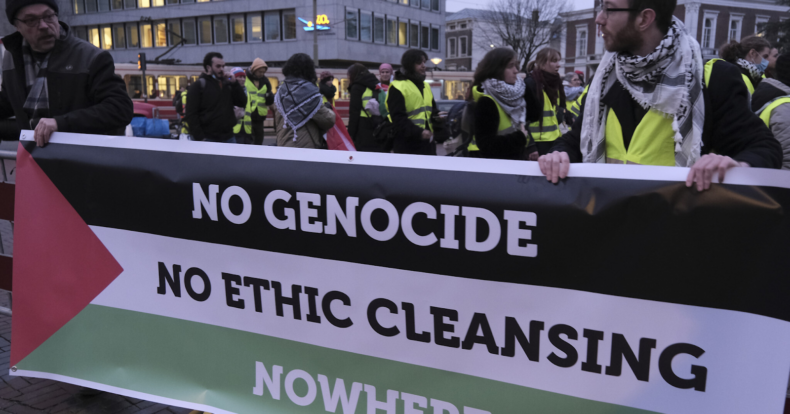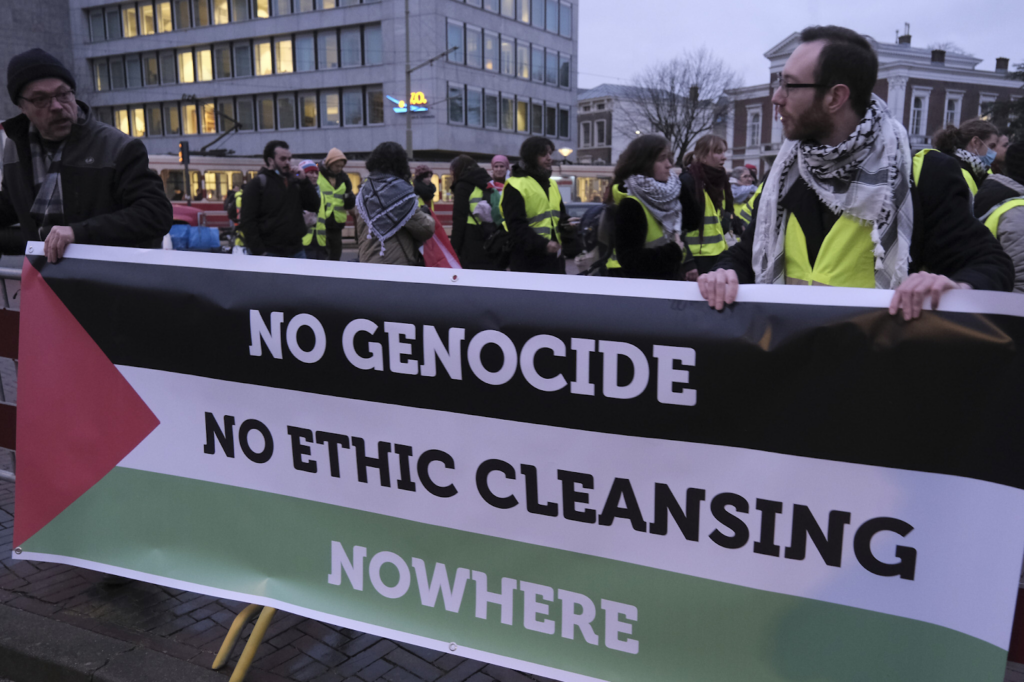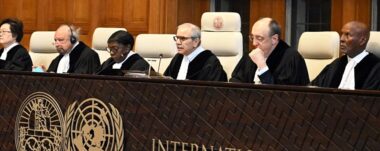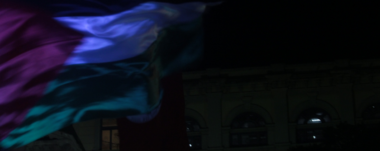Second Request For Urgent Interim Measures Before The ICJ By South Africa Against Israel

We share the text written by Professor Nicolás Boeglin, from the UCR Law School on the situation of South Africa and Israel. Original title: “Gaza / Israel: on the second request for urgent interim measures before the International Court of Justice (ICJ) of South Africa against Israel”.
On February 12, 2024, the International Court of Justice (ICJ) announced a second formal request for urgent provisional measures requested by South Africa against Israel after the first one filed on December 29, 2023.
The text of this second request, the full reading of which is recommended, can be consulted at this official ICJ link in french and in English.
Second South African Application In Brief
The text states particularly that the actions planned by Israel in Rafah for the second week of February 2024 must be stopped at all costs in view of the senseless drama they will provoke. This is an area that concentrates a large number of refugees coming from other regions of Gaza previously bombed by Israel since the afternoon/evening of October 7, 2023:
7. La République sud-africaine est gravement préoccupée par le fait que l’offensive militaire sans précédent contre Rafah, telle qu’elle a été annoncée par l’État d’Israël, causera en sus de ceux déjà causés des massacres, dommages et destructions à grande échelle, en violation grave et irréparable tant de la convention sur le génocide que de l’ordonnance rendue par la Cour le 26 janvier 2024. En conséquence, et au vu de la situation d’extrême urgence, la République sud-africaine demande que la Cour envisage, à titre exceptionnel, d’exercer le pouvoir que lui confère le paragraphe 1 de l’article 75 de son Règlement, qui dispose comme suit : « La Cour peut à tout moment décider d’examiner d’office si les circonstances de l’affaire exigent l’indication de mesures conservatoires que les parties ou l’une d’elles devraient prendre ou exécuter.
8. La Cour conserve l’entière discrétion d’exercer ce pouvoir en l’affaire relative à l’Application de la convention pour la prévention et la répression du crime de génocide dans la bande de Gaza (Afrique du Sud c. Israël), sans qu’une audience soit tenue ni que des exposés soient présentés par les Parties, et, à la lumière du précédent que constitue l’affaire LaGrand (Allemagne c. États-Unis d’Amérique), il convient qu’elle le fasse, compte tenu de l’extrême urgence de la situation et du risque imminent de préjudice. Comme elle l’a précisé en l’affaire LaGrand, la Cour « peut, en cas d’extrême urgence, procéder sans tenir d’audience » à l’indication de mesures conservatoires, et « il [lui] appartient … de décider dans chaque cas si, au vu des particularités de l’espèce, elle doit faire usage dudit pouvoir.
9. En l’affaire LaGrand, la Cour a exercé le pouvoir que lui confère le paragraphe 1 de l’article 75 dans une situation d’extrême urgence concernant une personne. En la présente espèce, la situation d’extrême urgence concerne environ 1,4 million de Palestiniens vulnérables à Rafah, dont la moitié au moins sont des enfants. Cette population court un risque grave qu’un préjudice irréparable soit causé à son droit d’être protégée contre des actes de génocide emportant violation des articles II et [III] de la convention sur le génocide par un État dont la Cour a déjà jugé que le comportement constitue plausiblement un manquement aux obligations découlant de cet instrument.
South Africa Israel
7. The Republic of South Africa is gravely concerned that the unprecedented military offensive against Rafah, as announced by the State of Israel, has already led to and will result in further largescale killing, harm and destruction in serious and irreparable breach both of the Genocide Convention and of the Court’s Order of 26 January 2024. Accordingly, and having regard to the situation of extreme emergency, the Republic of South Africa respectfully requests that the Court exceptionally consider exercising its power under Article 75(1) of the Rules of Court. Article 75(1) provides that: “The Court may at any time decide to examine proprio motu whether the circumstances of the case require the indication of provisional measures which ought to be taken or complied with by any or all of the parties.
8. The Court retains full discretion to exercise this power in the Application of the Convention on the Prevention and Punishment of the Crime of Genocide in the Gaza Strip (South Africa v. Israel), without any hearing or submissions by parties, and should do so, pursuant to the precedent case of LaGrand (Germany v. United States of America),19 given the extreme urgency of the situation and the imminent risk of harm. As stated by the Court in LaGrand, the Court “may, in the event of extreme urgency, proceed without holding oral hearings” to order provisional measures,26 and “it is for the Court to decide in each case if, in the light of the particular circumstances of the case, it should make use of the said power?
9. In LaGrand, the Court exercised its Article 75(1) power in a situation of extreme urgency affecting one individual. Here there is a situation of extreme urgency affecting an estimated 1.4 million vulnerable Palestinians in Rafah, at least half of them children. They are at serious risk of irreparable harm to their right to be protected from acts of genocide contrary to Articles II and II of the Genocide Convention, by a State which has already been found by this Court to be acting in plausible breach of its obligations under that Convention.
South Africa Israel
We had the opportunity to analyze the scope of the ordinance issued by the ICJ last January 26, which has been ignored by Israel since that date in Gaza: we refer our esteemed readers to a previous note of ours entitled “Gaza / Israel: on the International Court of Justice (ICJ) ordinance“..
An ICJ Ordinance Awaiting Compliance As Of January 26th
The latest available status report prepared by the United Nations (as of February 14, 2024, see report) states that Israel’s relentless deadly actions continue with unjustifiable death and injury tolls:
- Intense Israeli bombardment from air, land and sea continues to be reported across much of the Gaza Strip, resulting in further civilian casualties, displacement, and destruction of civilian infrastructure. Ground operations and heavy fighting between Israeli forces and Palestinian armed groups also continue to be reported, especially in Gaza’s southern city of Khan Younis.
- Between the afternoon of 13 February and 12:00 on 14 February, according to the Ministry of Health (MoH) in Gaza, 103 Palestinians were killed, and 145 Palestinians were injured. Between 7 October 2023 and 12:00 on 14 February 2024, at least 28,576 Palestinians were killed in Gaza and 68,291 Palestinians were injured, according to MoH in Gaza.
- Airstrikes on Gaza’s southernmost city of Rafah and statements by Israeli officials have heightened concerns about a possible ground invasion in Rafah where well over one million people are crammed amid insecurity and acute shortages of shelter, food, clean water, and medical care. On 13 February, Under-Secretary-General for Humanitarian Affairs and Emergency Relief Coordinator, Martin Griffiths, warned that a military operation in Rafah “could lead to a slaughter in Gaza” and “leave an already fragile humanitarian operation at death’s door,” noting that the “Government of Israel cannot continue to ignore these calls” by the international community.
South Africa Israel
As can be seen, Israel has not changed its actions in Gaza since January 26, 2024, but continues its incessant, disproportionate and indiscriminate bombardment of Gaza similar to those launched since October 7 in the afternoon/evening. In more than four months of intense bombardment, Israel has not been able to achieve its initial objectives, as the hostages remain hidden in Gaza with their custodians, and as the Hamas military leaders continue to instruct their fighters and fire rockets into Israel with some regularity from Gaza.
As for the death and injury toll of Israel’s offensive in Gaza, a former military officer in France and noted expert on aerial bombardment indicates in a blog post entitled “Laissons Netanyahou dévaster la bande de Gaza et Poutine écraser l’Ukraine ?” (see full postwith a very detailed set of maps) that:
South Africa Israel
Pour achever la dévastation de la bande Gaza, dont les ¾ ont été effectués en 4 mois de guerre, il ne manque plus à Netanyahou que quelques semaines pour y parvenir, un ou deux mois peut-être. Le bilan sera catastrophique en pertes humaines, l’actuel étant largement sous-estimé puisqu’il n’intègre pas les 8 à 9,000 « disparus » déjà recensés par ce qui reste de l’état-civil de Gaza, auquel il faut rajouter les personnes ensevelies sous les décombres et que personne ne recherche.
Compte tenu de l’intensité et de la durée des bombardements effectués par l’armée israélienne, une fois « l’offensive massive » sur Rafah achevée, les victimes palestiniennes dépasseront les 50,000 morts. Je parle volontairement de « victimes » car pour 80%, ce seront des civils sans rapport avec les miliciens du Hamas. Il faudra encore multiplier par 3 à 4 le nombre de blessés, soit un total supérieur à 200,000 morts et blessés à la fin de cette offensive israélienne.
Actions At International Courts Of Other States
With regard to other States, which support the actions of South African diplomacy, we had the opportunity in a previous note to explain the scope of the request for intervention filed by Nicaragua last January 22, which was made known by the ICJ on February 8, 2024: see our previous note entitled “Gaza / Israel: regarding Nicaragua’s recent request for intervention before the International Court of Justice (ICJ) in the lawsuit of South Africa against Israel“.
Regarding the text of the first South African lawsuit as such filed on December 29, 2023, the full text which we recommend reading (and in particular the detail of the chilling official statements of Israel’s highest authorities in paragraphs 101-107), it is available in full in French and in English.
Indeed, in recent comments by Professor Al Tamimi published on the EJIL-Talk portal (see article entitled “Implications of the ICJ Order (South Africa v. Israel) for Third States“), the author specifies in his conclusions the urgent task that awaits States in the face of the challenge posed by Israel to the international community. Israel) for Third States”, whose full reading is recommended), the author specifies in his conclusions the unpostponable task that awaits the States in the face of the challenge that Israel poses to the international community, by not seeming willing to abide by the ICJ order since January 26, 2024:
South Africa Israel
“Since the ICJ handed down its provisional measures Order on 26 January, Israeli forces have reportedly killed hundreds of Palestinians as per UNOCHA’s daily briefings, civilians waiting to receive humanitarian aid were shot and injured, hospital staff have been killed, and government ministers called for the displacement of Palestinians from Gaza at a far-right conference. These events underscore the real and imminent risk of irreparable damage facing rights plausibly protected under the Genocide Convention. At a time when the credibility of international law hangs in the balance, the ICJ demonstrated the enduring relevance of its guidance by issuing a firm ruling in front of an expectant legal and non-legal community. States are now called upon to ensure, beyond assurances and words, that they are ready to take action to ensure compliance”.
A “plausible” risk of genocide in Gaza, confirmed by the ICJ since January 26, 2024, and a State that since then continues to defy international justice with its senseless actions in Gaza, challenge all members of the international community, both nationally and internationally.
As an example, at a national level, last February 12, Israeli authorities were informed of a national court ruling ordering an immediate halt to exports of components to Israel for F-35 fighter jets from the Netherlands (see note from the BBC on February 12).

In relation to another international instance based in The Hague, the International Criminal Court (ICC), in another previous note, entitled “Gaza / Israel: regarding the announcement of the joint referral by Mexico and Chile to the International Criminal Court (ICC)” we were able to analyze the scope of the joint referral made by Chile and Mexico in view of the drama being experienced in Gaza.
It is not superfluous to point out the recent joint initiative of Spain and Ireland within the European Union in the face of the sanctions regime envisaged when a State that has an association agreement flagrantly and massively violates human rights (see note from The Guardian of February 15, 2024).
In Conclusion
At the beginning of 2024, a state like South Africa stands out before the world for its tireless legal battle before international justice in order to stop Israel’s pretensions in Gaza. While South Africa has strengthened its prestige and image in a way rarely seen, Israel’s prestige is totally discredited, and its allies feel increasingly uncomfortable.
Israel has lent itself to conduct an information war, with for example beheaded babies that never left any paper trail (see note from Los Angeles Press) or an alleged Hamas main command center under Al Shifa hospital in Gaza that was never found: these are just some of the many “irrefutable evidence” that evaporated like air, and on which Israel has tried to build a discourse to justify its action.
Now, testing international justice and upholding the elementary principles of international humanitarian law in the face of Israel’s senseless military action in Gaza should be embraced by many other states, besides South Africa. However, many remain mired in a passivity and inaction that is strikingly conspicuous. In particular the states of Europe, the Arabian Peninsula, as well as those located in the North of the American continent, from which a greater consistency with their positions in defense of international justice and the rules that prevail in the international legal order would be expected.
South Africa Israel
It should be pointed out that in the face of the legal actions brought by South Africa, the Israeli state apparatus has not been able to provide convincing answers: the simple fact that the ICJ order issued on January 26 was adopted with 16 votes in favor and only one judge against, or in some points of the order, with 15 votes in favor and 2 votes against (see details in paragraph 86 of the ICJ order of January 26) shows the weakness of the Israeli legal defense before the judges in The Hague.
Given the forcefulness of the petition prepared by the South African diplomacy, Israel has had no choice but to launch from various quarters expletives, threats and other angry reactions that are no longer very impressive.
In this regard, it is noteworthy that recently the head of the South African diplomacy made it clear that she receives veiled threats on social networks, pointing bluntly at the Israeli intelligence services. In this press release published on February 8, it can be read that:
I felt that [it would] be better if we had extra security. But what I’m more concerned about is my family, because in some of the social media messages my children are mentioned and so on, but this is par for the course. The Israeli agents, the intelligence services, [this] is how they behave, and they seek to intimidate you, so we must not be intimidated. There is a cause that is under way.
If you want to know more about this topic, this article may interest you: Israel To Be Accused Of Genocide In The Gaza War At The International Court Of Justice
Text shared by Nicolás Boeglin, Professor of International Public Law, School of Law, University of Costa Rica (UCR). Contact: [email protected]




